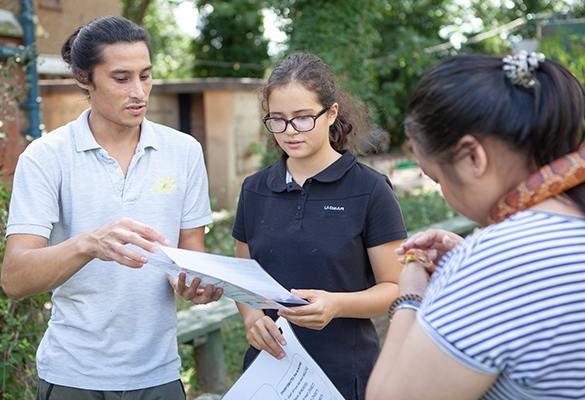The Hub
Accidents & Incidents
Reporting and recording accidents and incidents is a legal requirement. The report is used to inform the enforcing authorities for occupational health and safety (Health and Safety Executive and local authorities) about serious incidents and cases of disease to enable them to identify where and how risks arise and whether they need to be investigated.
Accident and Incident reporting with 'My Compliance'
It looks like underreporting is a big issue across the Council, and we want to change that! Several factors contribute to this problem: limited time, not knowing the need or how to report, understanding why it's important, and thinking it's too difficult.
But don't worry! This Accident & Incident reporting guide will give you the basics on what you need to do to report effectively. We are reviewing our processes to make it easier for everyone and collate the information we need in a timely manner.
We encourage all staff members to promptly report any accidents, near misses or incidents of physical/verbal abuse they experience or witness so that appropriate actions can be taken to prevent a future recurrence. Let's make our workplace safer together!
RIDDOR (Reporting of Injuries, Diseases and Dangerous Occurrences Regulations)
Some incidents have to be reported to the Health and Safety Executive (HSE) as a RIDDOR if i) the accident is work related, and ii) it results in a reportable injury. These can be divided in to:
As a general rule if the accident has been correctly reported using the council’s accident reporting system then we will complete the RIDDOR report on your behalf based on the information provided via My Compliance. If the initial report is not received or correctly completed then e. The senior officer / headteacher is responsible for submitting the report.
Timely reporting is crucial. We have a legal obligation to notify the HSE within specific timescales. Late reporting could result in prosecution and potential fines:
- Within 10 days: Fatalities and major injuries should be reported as soon as possible to HSE.
- Within 15 days: Over-seven-day injuries must be reported
- Occupational diseases: reported as soon as diagnosed by a member of the medical profession
- Dangerous occurrences: and gas incidents require immediate notification to ensure compliance and enable swift action by the authorities.
Employers Responsibilities
Employers must keep a record of any reportable death, injury, occupational disease and any work-related injury that results in an employee being away from work or unable to do their full range of normal duties for more than three consecutive days.
Reports are used to inform the enforcing authorities for occupational health and safety (Health and Safety Executive and local authorities) about serious incidents and cases of disease, to enable them to identify where and how risks arise and whether they need to be investigated.
More information for employers about reporting accidents, incidents and diseases can be found on the HSE website.
The page covers the following areas:


Early Years Accident and Incident reporting
The Early Years Foundation Stage 2017 requires providers to tell Ofsted about any ‘serious’ accidents or injuries that have occurred in their setting as soon as reasonably possible, but at a maximum within fourteen days. A registered provider, who, without reasonable excuse, fails to comply with this requirement, commits an offence.
It is essential that practitioners keep accident books, record forms and completed risk assessments up-to-date. Contact numbers should also be held at all times, both at your setting and when children are taken out.
Providers must also notify local child protection agencies of any serious accident or injury to, or the death of, any child while in their care, and must act on any advice from those agencies.
What is considered a 'serious' accident?
‘Serious’ accidents include broken bones, or when a child loses consciousness or requiring admittance to hospital for more than 24 hours.
Minor injuries such as sprains, strains or falls do not require you to report to Ofsted, even if you take the child to your local accident and emergency department to have the injury checked out. Further information can be found on pages 20 and 21 of the Early Years Ofsted Compliance Book.
What information should I be recording?
Should a child have an accident, you will be asked to provide Ofsted with the following information:
- date and time of the accident
- location and full description of the place the accident happened
- details of child/children involved
- a full summary giving a picture leading up to the accident, what your / others actions were during the accident and what your / others actions were following the accident, details surrounding before, during and after the accident
- what / if any first aid was administered
- how long after the accident happened were parents informed?
- did parent complete and sign the accident form?
- was the child given any treatment in hospital or by a doctor? If so, what was it?
- has the child required any further treatment relating to the accident?
- have you updated your risk assessment since the accident
- have you noted any changes you have / plan to make to prevent re-occurrence?
You must notify Ofsted about:
- the death of a child whilst in your care, or later, as the result of something that happens while the child was in your care
- death or serious accident or serious injury to any other person on your premises (childcare register only)
- where a child in your care needs to go to an Accident and Emergency Department of a hospital (and requires hospitalisation for more than 24 hours), either directly from your provision or later, as the result of something that happened while the child was in your care
- any significant event that is likely to affect the suitability to care for children (see the childcare register regulations 2008, regulation 6, schedule 3, paragraph 26)
- a child sustaining any serious injuries
Providers can use an online reporting form to notify Ofsted of any significant events or changes occurring at, or affecting their provision.
What happens next?
All accidents/injury/serious illness/death are dealt with by Ofsted's Compliance, Investigation and Enforcement Team.
They will visit your home/setting and will:
- look at your risk assessments and how often they are carried out
- need to see the written parental permission for the trip if a serious accident had taken place off-site
- look at the signed parental permissions for children to have emergency medical treatment
- look at whether you take the relative risk assessment documentation and emergency contact details with you every time you go off-site
- need a copy of the accident report, including all relevant signatures


Schools Accident and Incident reporting (AIR)
Any LBWF employees, including those within maintained schools and their contractors must now use the online Accident and Incident Reporting (AIR) tool to report accidents and incidents.
Please only report accidents or incidents after the situation has been made safe and FIRST AID has been administered if required.
Refer to the Local Code of Practice Accident reporting Procedure 2022-23
How do I report an accident or incident?
In the event of an incident the injured person or the line manager for the activity must report the incident as soon as possible and the report must be an accurate description of what has happened. Reports are made via the My Compliance incident reporting form and can be made using a mobile phone, tablet or computer. Access to the register can be gained using the QR code on the posters displayed in schools. The large QR code takes you to the school register via your internet browser, the small QR code is for staff that have downloaded and use the “My Incidents App” from either Google Play or Apple Store. The poster and QR code is unique for your school.
Contact the Health, Safety and Wellbeing Team to get a copy of your school’s poster.
What should I report?
Any accident or incident must be reported whether it is to an employee, service user, student, visitor or contractor. This includes any near miss* verbal abuse, assaults and violence.
*A near miss is an event not causing harm, but has the potential to cause injury or ill health. An example of a reportable near miss is a trailing cable across a walkway; this could potentially result in a head injury from tripping and falling on a corner of a desk. Another example is somebody working at heights and dropping a spanner off the side narrowly missing someone below.
Who can make a report?
The system is open to any employee or contractor to LBWF. Employees and contractors can also report incident and accidents occurring for another employee, a service user, a student, a visitor or contractor.
Contact the Health, Safety and Wellbeing Team to get a copy of your school’s poster.
What happens to my report?
The report will be electronically sent to:
- the school management for verification and investigation
- the Health, Safety and Wellbeing Team
Why should you report Accidents/Incidents?
There are many reasons for reporting incidents, accidents and near misses:
- to identify the cause of accidents
- to stop them from re-occurring
- to comply with legislation
- to enable accident trends to be identified so that we can tackle the root causes of accidents e.g. lack of suitable training, Potentially Violent Customers etc.
What Happens After an Accident?
If there has been an injury, the injured person must get the treatment that they need. All accidents should be investigated and the manager concerned must (if necessary), take action to avoid a re-occurrence. If necessary, risk assessments should be reviewed and appropriate new control measures introduced. After an assault, whether verbal or physical, an offer of counselling via Occupational Health should be made.
The Health and Safety Team review accident statistics and trends every 3 months and use anonymised information to prevent further occurrences.
How is the data managed?
Data is closely managed in line with GDPR, where if it’s necessary to share information we will gain permission first. We will always ask you before sharing information and copy you into any investigation and report documentation. Certain circumstances demand that we report an incident to the Health and Safety Executive (HSE), this is driven by the Reporting of Injuries, Diseases and Dangerous Occurrences Regulations 2013 (RIDDOR).
Find out more about our Traded Services?
Please see our privacy policy for more details